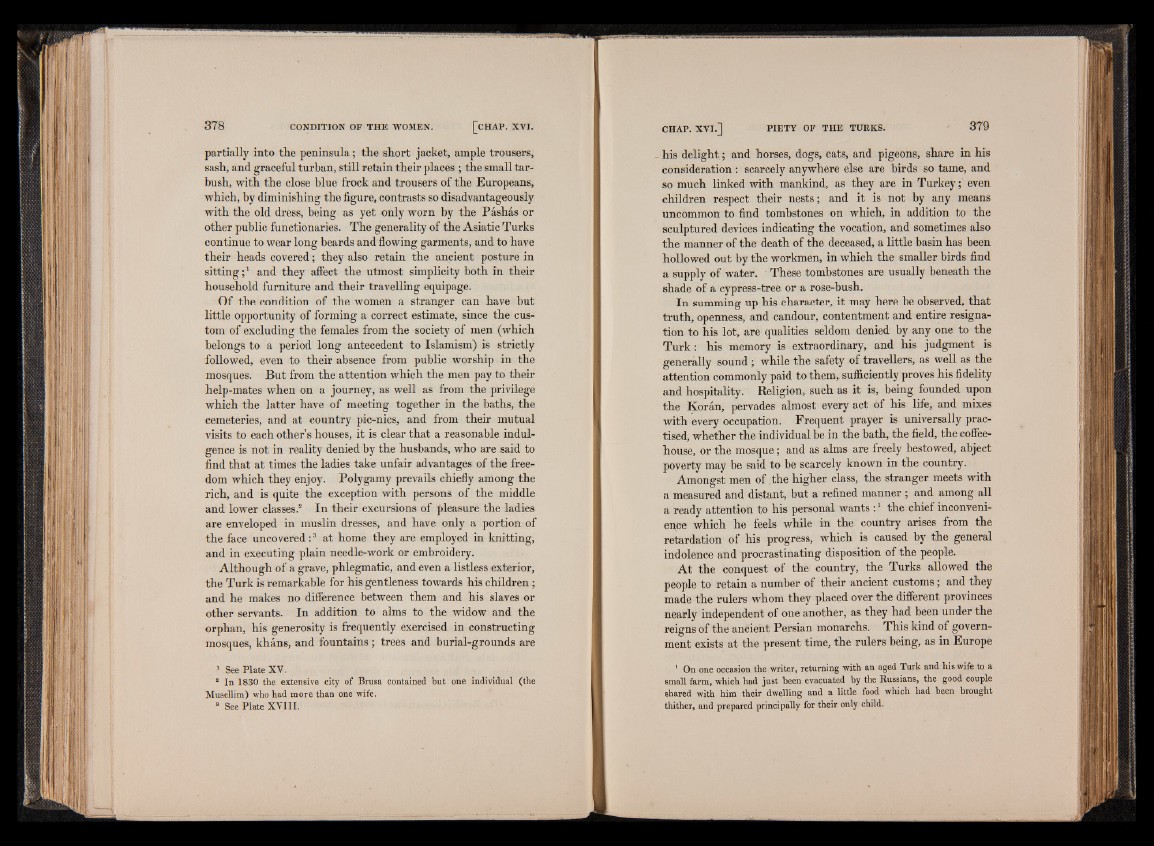
partially into the peninsula; the short jacket, ample trousers,
sash, and graceful turban, still retain their places ; the small tar-
bush, with the close blue frock and trousers of the Europeans,
which, by diminishing the figure, contrasts so disadvantageously
with the old dress, being as yet only worn by the Pashas or
other public functionaries. The generality of the Asiatic Turks
continue to wear long beards and flowing garments, and to have
their heads covered; they also retain the ancient posture in
sitting;1 and they affect the utmost simplicity both in their
household furniture and their travelling equipage.
Of the condition of the women a stranger can have but
little opportunity of forming a correct estimate, since the custom
of excluding the females from the society of men (which
belongs to a period long antecedent to Islamism) is strictly
followed, even to their absence from public worship in the
mosques. But from the attention which the men pay to their
help-mates when on a journey, as well as from the privilege
which the latter have of meeting together in the baths, the
cemeteries, and at country pic-nics, and from their mutual
visits to each other’s houses, it is clear that a reasonable indulgence
is not in reality denied by the husbands, who are said to
find that at times the ladies take unfair advantages of the freedom
which they enjoy. Polygamy prevails chiefly among the
rich, and is quite the exception with persons of the middle
and lower classes.2 In their excursions of pleasure the ladies
are enveloped in muslin dresses, and have only a portion of
the face uncovered:3 at home they are employed in knitting,
and in executing plain needle-work or embroidery.
Although of a grave, phlegmatic, and even a listless exterior,
the Turk is remarkable for his gentleness towards his children;
and he makes no difference between them and his slaves or
other servants. In addition to alms to the widow and the
orphan, his generosity is frequently exercised in constructing
mosques, khans, and fountains ; trees and burial-grounds are
1 See Plate XV.
‘ In 1830 the extensive city of Brusa contained but one individual (the
Musellim) who had more than one wife.
3 See Plate XVIII.
his delight; and horses, dogs, cats, and pigeons, share in his
consideration : scarcely anywhere else are birds so tame, and
so much linked with mankind, as they are in Turkey; even
children respect their nests; and it is not by any means
uncommon to find tombstones on which, in addition to the
sculptured devices indicating the vocation, and sometimes also
the manner of the death of the deceased, a little basin has been
hollowed out by the workmen, in which the smaller birds find
a supply of water. These tombstones are usually beneath the
shade of a cypress-tree or a rose-bush.
In summing up his character, it may here be observed, that
truth, openness, and candour, contentment and entire resignation
to his lot, are qualities seldom denied by any one to the
Turk: his memory is extraordinary, and his judgment is
generally sound ; while the safety of travellers, as well as the
attention commonly paid to them, sufficiently proves his fidelity
and hospitality. Religion, such as it is, being founded upon
the Koran, pervades almost every act of his life, and mixes
with every occupation. Frequent prayer is universally practised,
whether the individual be in the bath, the field, the coffeehouse,
or the mosque; and as alms are freely bestowed, abject
poverty may be said to be scarcely known in the country.
Amongst men of ,the higher class, the stranger meets with
a measured and distant, but a refined manner ; and among all
a ready attention to his personal wants :1 the chief inconvenience
which he feels while in the country arises from the
retardation of his progress, which is caused by the general
indolence and procrastinating disposition of the people.
At the conquest of the country, the Turks allowed the
people to retain a number of their ancient customs; and they
made the rulers whom they placed over the different provinces
nearly independent of one another, as they had been under the
reigns of the ancient Persian monarchs. This kind of government
exists at the present time, the rulers being, as in Europe
1 On one occasion the writer, returning with an aged Turk and his wife to a
small farm, which had just been evacuated by the Russians, the good couple
shared with him their dwelling and a little food which had been brought
thither, and prepared principally for their only child.